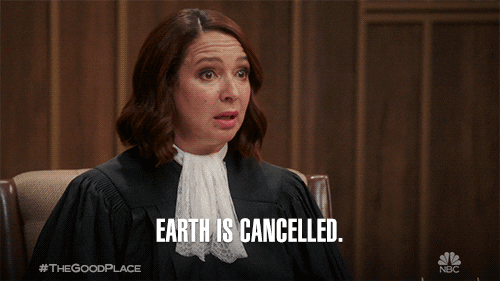#3. Who We've Cancelled This Week
Vote, Vote, Vote!
Just kidding, I'm not going all political on you. Although I'm sure the U.S. presidential election is top of mind for many. I even had someone in Ireland wish me well this past week on a business call.
With that said, Halloween being just yesterday, I thought I'd get some thoughts out about something pretty spooky...cancel culture and impact on social media marketing.
Because with all the sociopolitical issues being increasingly discussed, I've been seeing a lot of recent examples to highlight.

I was surprised when cancel culture surprisingly became one of the divisive platform topics.
Mainly because you see calls to cancel or boycott both individuals and brands from all areas of the political spectrum.
Just this past week a report announced that Netflix lost between 5 and 8x more subscribers in early September than in the entire month of August. This span of time coincides with the #CancelNetflix battlecry that erupted on Twitter in response to the streaming giant adding the movie "Cuties" to its collection.
Cuties is billed as a coming-of-age, semi-biographical movie about a pre-teen girl from a black Muslim background growing up in Paris and exploring her sexuality as part of a twerk team (think Nicki Minaj music video type dancing).
Many (and particularly conservatives) called it wildly offensive and demanded it be removed. Long story short, Netflix doubled down. People followed through on their cancellation threats.

And bet you didn't expect the Girl Scouts to get a mention here.
But in just another surprise 2020-is-crazy move, the organization gave a shout out to the newest Supreme Court justice, tweeting, “Congratulations Amy Coney Barrett on becoming the 5th woman appointed to the Supreme Court since its inception in 1789.”
Which ticked off a lot of people and resulted in Girl Scouts deleting the tweet. (Quick social media lesson: Deleting a tweet doesn't also delete it from people's memories.)

And I don't know about you, but I have been closely following the backlash against best-selling author and apparently super polarizing figure JK Rowling.
She tweeted earlier this year about her belief that there should be a legal and scientific distinction between trans-women and people assigned at birth as biologically female, which led to a big online debate about gender identity, sex, and when public figures should learn to just be quiet and let a PA manage their Twitter account.
It also led a number of public figures and journalists to release an editorial statement condemning cancel culture as a movement that stifles free speech and thought by creating fear of expressing one's true beliefs. Then that led to another counter-statement signed by over 1,500 writers and publishers standing against speech that could be categorized as discriminatory.
Which brings us to the question:
Is cancel (and boycott) culture a good or bad thing?

Well, Friend, if you were expecting me to give all the answers in a brief newsletter, I am sorely sorry to disappoint you.
I will say this.
Cancel culture results from the visibility given to a variety of different communities and voices. Including those that previously would've been viewed as too small and inconsequential by the mainstream to deserve having their voices heard.
Something like the offensive cultural missteps seen in movies like Breakfast at Tiffany's or Disney's original animated Dumbo probably wouldn't have gone unchecked. Because the people who are directly impacted and hurt by that kind of negative representation could've spoken up and had their voices amplified.
However, there are definitely those who are taking advantage of the power of social media and the amplification of fringe voices.
Hate and division seem to really be a successful way of gaining a large audience on social media, and you can build a powerful brand on the basis of just stirring up anger by creating an Us vs. Them mentality. (Anybody watch The Social Dilemma?)
For brands, it's about finding the right balance between responding to the concerns of your customers and not letting your entire marketing strategy be guided by backlash.
Customers want to know what a brand's values are as they choose where to place their spending power and loyalty. There's not as much wiggle room to ride the fence with tepid messaging.
And either way, businesses run the risk of offending or alienating some of their customers.
It's enough to make you want to log off forever and just eat leftover, discounted Halloween candy and watch (Netflix...oops, no) Hallmark holiday movie specials!
That said, I'm wishing you well this week! Please be sure to practice any self-care necessary to manage your stress, including logging offline.
And I'll see you back here next weekend! (Not much longer until we can cancel 2020 and kick off a new year! Woo hoo!)
Other News in 3-2-1:
A Quick Comparison of Macro- vs Micro-Influencers, Including Some Industry Benchmarks for Engagement Rates and Costs
Want Some Step-By-Step Tips to Improve Your Sales and Marketing Messages?
And of course -- more stuff on how to successfully build a personal or corporate brand on social media! [Podcast]

Enjoyed this content? I'd appreciate your help in sharing this with others using the icons below!

